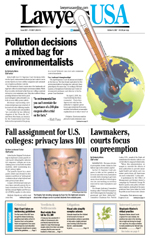 Right now the U.S. Supreme Court is hearing oral arguments in the cases that seek to determine the parameter of constitutional rights afforded to 305 “military combatant” detainees in Guantanamo Bay. The cases drew hundreds of spectators both inside and outside One First Street, NE, and dozens of news organizations have set up cameras outside of the Court this snowing morning. More on the buzz surrounding the case here from the Associated Press.
Right now the U.S. Supreme Court is hearing oral arguments in the cases that seek to determine the parameter of constitutional rights afforded to 305 “military combatant” detainees in Guantanamo Bay. The cases drew hundreds of spectators both inside and outside One First Street, NE, and dozens of news organizations have set up cameras outside of the Court this snowing morning. More on the buzz surrounding the case here from the Associated Press.
UPDATE: More from the Associated Press here about the arguments, during which Justice Antonin Scalia and Chief Justice John Roberts grilled the detainees’ attorney. At one point, Scalia demanded the attorney “show me one case” granting the right of alien detainees to challenge their detention in civilian courts.
Some time after 11:15 a.m. the court will release the audio transcripts from the oral argument, which will be made available by a number of media outlets including C-SPAN, which will make the audio available on its website here.
SCOTUSBlog‘s Lyle Denniston will also be providing a dispatch from the court today after arguments have concluded.



 Posted by Kimberly Atkins
Posted by Kimberly Atkins 
 Despite having been a law clerk for the late Chief Justice William Rehnquist, Garre must have had a case of the jitters, because he referred to Justice Samuel Alito by the wrong name.
Despite having been a law clerk for the late Chief Justice William Rehnquist, Garre must have had a case of the jitters, because he referred to Justice Samuel Alito by the wrong name. “Well, I would point to several criteria, Justice Scalia, in determining relevance,” Garre replied, spurring chuckles among those in the press gallery who caught the gaffe. Justice Antonin Scalia, of course, sits three seats away from Alito on the bench.
“Well, I would point to several criteria, Justice Scalia, in determining relevance,” Garre replied, spurring chuckles among those in the press gallery who caught the gaffe. Justice Antonin Scalia, of course, sits three seats away from Alito on the bench. Before oral arguments today, Attorney General Michael Mukasey made his first appearance before the U.S. Supreme Court as the nation’s attorney general.
Before oral arguments today, Attorney General Michael Mukasey made his first appearance before the U.S. Supreme Court as the nation’s attorney general. Welcome back! While DC Dicta was away and Congress was on vacation, the U.S. Supreme Court was hard at work, and that work will continue this week.
Welcome back! While DC Dicta was away and Congress was on vacation, the U.S. Supreme Court was hard at work, and that work will continue this week.
